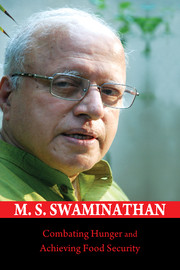Book contents
- Frontmatter
- Contents
- Foreword
- Preface
- Acknowledgements
- Abbreviations
- 1 Genesis and Growth of the Yield Revolution in Wheat
- 2 Our Agricultural Heritage
- 3 Shaping Our Agricultural Destiny
- 4 Thrust on Farm Revival
- 5 Nutri-farm Movement
- 6 Nutrition-sensitive Agriculture
- 7 Food Losses and Food Waste
- 8 Rice in Zero Hunger Challenge
- 9 Monsoon Management
- 10 Importance of Ecological Conservation
- 11 Caring for Ecology and Heritage
- 12 Conserving Biodiversity
- 13 Overcoming Hidden Hunger through Aquaculture
- 14 Biofuels – The Way to Go
- 15 Food Security
- 16 Vigilance for Sustainable Food Security
- 17 Food Security and Social Protection
- 18 Food Security and its Role
- 19 Sustaining the Livestock Revolution
- 20 Challenges in the Year of Science
- 21 Agriculture and Humanism
- 22 Fostering the Science of Science Communication
- 23 Olympic Move for Saving Children
- 24 Youth: The Agents of Change
- 25 Role of Women in Agricultural Production
- 26 Know-how to Do-how
- 27 From Bengal Famine to Right to Food
- 28 Financial Institutions and Fighting Food Inflation
- 29 Public Good Research in Agriculture
- 30 The Future of Indian Agriculture
- Bibliography
25 - Role of Women in Agricultural Production
Published online by Cambridge University Press: 18 December 2015
- Frontmatter
- Contents
- Foreword
- Preface
- Acknowledgements
- Abbreviations
- 1 Genesis and Growth of the Yield Revolution in Wheat
- 2 Our Agricultural Heritage
- 3 Shaping Our Agricultural Destiny
- 4 Thrust on Farm Revival
- 5 Nutri-farm Movement
- 6 Nutrition-sensitive Agriculture
- 7 Food Losses and Food Waste
- 8 Rice in Zero Hunger Challenge
- 9 Monsoon Management
- 10 Importance of Ecological Conservation
- 11 Caring for Ecology and Heritage
- 12 Conserving Biodiversity
- 13 Overcoming Hidden Hunger through Aquaculture
- 14 Biofuels – The Way to Go
- 15 Food Security
- 16 Vigilance for Sustainable Food Security
- 17 Food Security and Social Protection
- 18 Food Security and its Role
- 19 Sustaining the Livestock Revolution
- 20 Challenges in the Year of Science
- 21 Agriculture and Humanism
- 22 Fostering the Science of Science Communication
- 23 Olympic Move for Saving Children
- 24 Youth: The Agents of Change
- 25 Role of Women in Agricultural Production
- 26 Know-how to Do-how
- 27 From Bengal Famine to Right to Food
- 28 Financial Institutions and Fighting Food Inflation
- 29 Public Good Research in Agriculture
- 30 The Future of Indian Agriculture
- Bibliography
Summary
With a gradual decline in the size of farm holdings, small and marginal farmer families are in need of multiple sources of income to come out of the poverty trap. Rural men belonging to resource-poor families increasingly tend to go to towns and cities seeking work and income earning opportunities. Consequently, there is increasing feminization of agriculture. While women farmers are extremely hardworking and are also conversant with sustainable agriculture practices, they suffer from several handicaps such as title to land, as well as access to credit, inputs, insurance, technology and markets. As early as 1995, the Fourth World Conference on Women held in Beijing urged developing countries to pay attention to the gender specific needs of women farmers.
India has just enacted a landmark Food Security Act. Legal entitlements to food can be implemented only by improving the productivity, profitability and sustainability of small farm holdings, since small and marginal farmers produce nearly 50 per cent of the food-grains in the country, as well as milk and a wide variety of vegetables and fruits. The need for paying special attention to the needs of women farmers has been recognized by initiating a Mahila Kisan Sashaktikaran Pariyojana in the Union Budget of 2010–11.
In order to safeguard national food security, and to strengthen the livelihood security of rural women, a majority of whom are engaged in crop and animal husbandry, fisheries, agro-forestry and agro-processing, I introduced the Women Farmers’ Entitlements Bill in the Rajya Sabha on 11 May 2012.
The preamble to the Bill reads:
A Bill to provide for the gender specific needs of women farmers, to protect their legitimate needs and entitlements and to empower them with rights over agricultural land, water resources and other related rights and for other functions relating thereto and for matters connected therewith.
Whereas women constitute more than fifty per cent of Indian farmers and about sixty per cent of the workforce in the farming sector; and in view of the increasing feminisation of agriculture as a result of out-migration of men, entitlements for women farmers are essential for the future growth and health of agriculture, as well as protection of food security in an era of climate change; […]
- Type
- Chapter
- Information
- Combating Hunger and Achieving Food Security , pp. 135 - 140Publisher: Cambridge University PressPrint publication year: 2016



